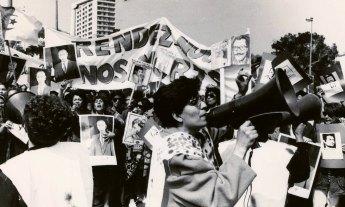Watch Benedetta Berti’s TED Talk, “The surprising way groups like ISIS stay in power” >>
It is virtually impossible to look at the news without being bombarded with graphic images of the ‘Islamic State’ (aka ISIS/ISIL/Dae’sh). Part of our fascination with the macabre activities of this group has to do with its sheer violence and brutality: ISIS’ blend of medieval tactics combined with its use of the Internet and skillful social media strategies makes it hard to look away. Meanwhile, analysts watch the group both because it attracts sizable numbers of “foreign fighters” and because it embodies a new transnational jihadist movement — a genuine challenge to the Al-Qaeda model.
But for me, ISIS is interesting for different reasons. I want to understand its unarmed activities — what its members do when not committing those headline-making atrocities.
I first became interested in this subject when I was working for a small human rights NGO in the remote and then-embattled southeastern region of Chiapas, Mexico. At the time I was tracking violence occurring between the Mexican Army, local indigenous communities affiliated with the Zapatista National Liberation Army (EZLN), an indigenous rebel group, and the numerous other paramilitary groups in the region.
During that time, I had plenty of opportunities to observe the day-to-day politics of rebellion. I became fascinated by how governance occurs in contested areas — and by how people organize in places where the state is weak or absent. Studying these questions and documenting what armed groups do when they are not fighting has become my life’s work, and I have traveled for it through Mexico and Central America, in Palestine, Lebanon, and many other places.
Naturally, the rise of the Islamic State and its claims to power has attracted my attention. However, studying this group is different, and complicated. For one thing, it’s almost impossible for westerners to work safely with ISIS or in regions that it holds. So, whereas I’m used to doing fieldwork, here I can only rely on secondary sources. I depend on hearing from journalists or citizens who live or have lived in the areas the Islamic State now holds; I use the direct information provided by ISIS itself. Of course, there are clear limitations here, but still it is possible to draw a portrait of the group and its approach to ruling.
What emerges is that ISIS is a complex, multi-layered, hybrid group that operates both as an armed organization and a political entity involved in administering and delivering social services at the grassroots level. When assuming control of different areas of both Iraq and Syria, ISIS sets up political and administrative institutions to rule over the territory it controls. It establishes a police force, an embryonic judicial system, an education department, as well as social services, such as their much-advertised “bakeries” or offices to distribute assistance. (At times, this is simply rebranding and redistributing international humanitarian aid.) These activities are as crucial to the group’s strategy as their violent armed campaigns; they allow ISIS to increase its control over territory and resources as well as its power over the population.
Without considering the full picture of what ISIS is doing within its strongholds, it is, put simply, impossible to develop a counter-strategy. For instance, you can’t understand its expansion within Syria without appreciating the country’s bloody civil war, the brutal authoritarian regime and the complete breakdown of central authority. This, coupled with the deterioration of the country’s physical infrastructure and social fabric, created a vacuum and state of widespread insecurity that is like catnip for groups like ISIS. Armed struggle might have been the initial force that allowed it to rise to prominence, but its hybrid social-political work helps it to survive and expand.
This is why I strongly believe that to counter the rise of groups like ISIS, we need to think beyond the military realm. In Syria, that means recognizing that fighting has become one of the few occupations available to the beleaguered, impoverished population. Policies to tackle the pervasive and profoundly destabilizing human tragedy should be central to any anti-ISIS strategy. Understanding the day-to-day politics of rebellion and the complex activities of armed groups — regardless of their ideological or geographical focus — can truly help us to better understand these organizations, in turn making it easier to defeat them.

















